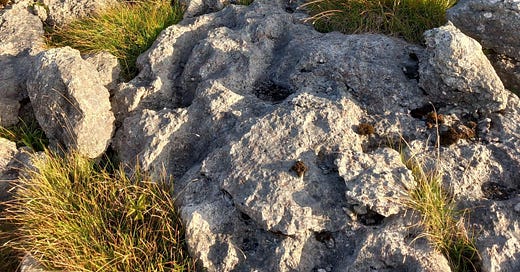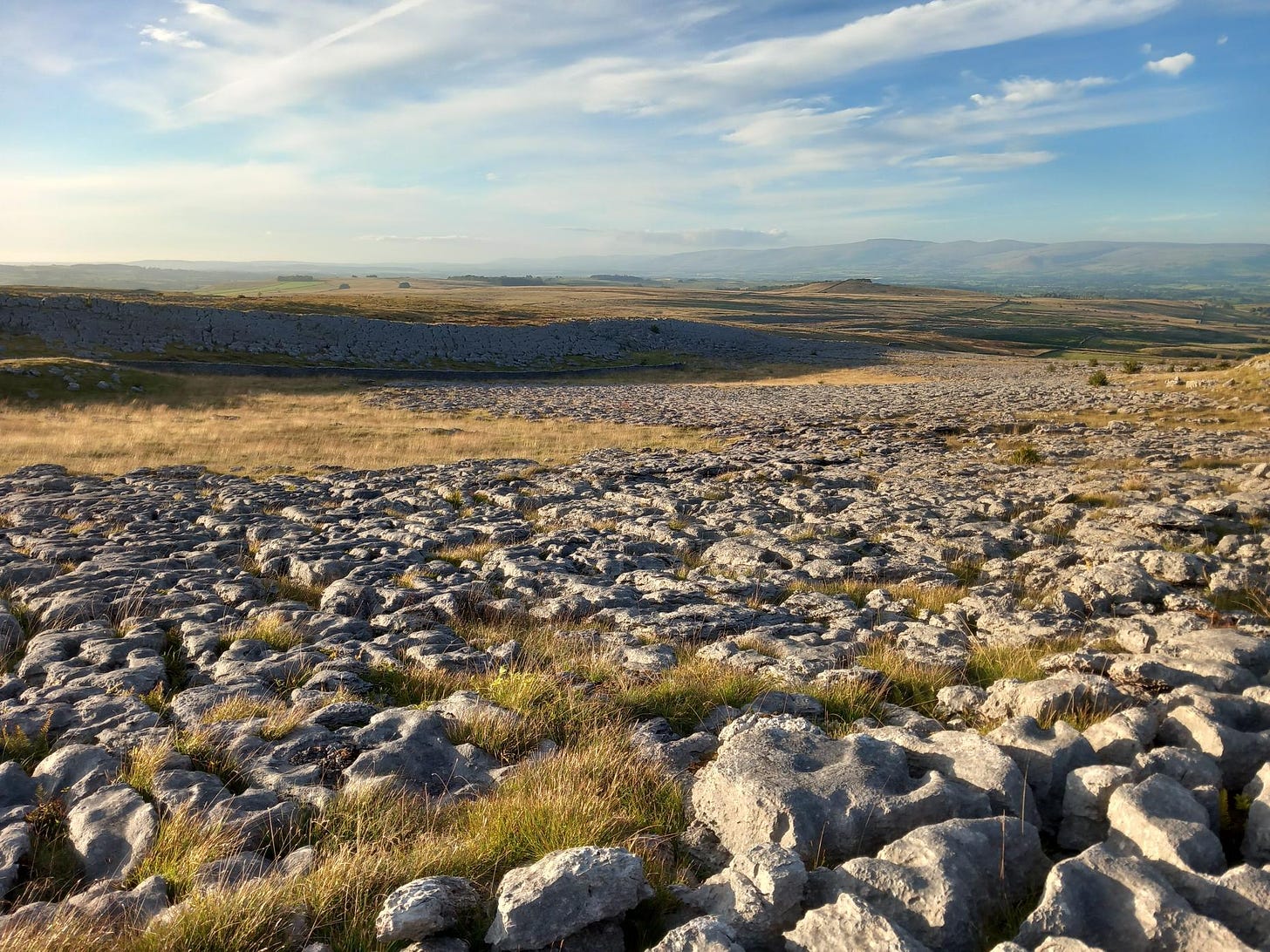Our feet remember it all. Every step taken. Each track we have followed. They record the omission of the scent-trails from which we turned away. The very thought of them makes the tips of our toes itch and mither. Those other fingers, which we cover up with boots and socks, they patiently catalogue our lives for future reference. Combing through the records, I can be certain that I do not know this bare-bones place where the earth has sloughed its skin. It is clear that it does not know me. We appraise one another with the caution of experienced travellers. Strangers chanced on the road. I cannot hope to speak its language. It has no interest in mine. The clints and grykes of a limestone pavement do not wish to be translated. In any case, who could ever transliterate the sensual sway of maidenhair spleenwort? Who would dare to touch harts-tongue fern with words?
Arriving here from the east, with the sun in my face, my eyes were drawn down, bewitched by the never-the-same of calcareous grassland. Harebells fluttered above any known name of blue. And then, over gentle a rise, this shocking naked corpse of limestone, recently exhumed from a shallow grave by the bone-grinding dogs of glaciation. Old wounds that somehow never healed.
I reach the edge of this one-time seabed at that quiet time of a day’s flood and ebb, when high tide is fretting on the turn. Time takes one short-sharp in-snatch of breath and holds it. Not exactly dusk. The prelude to dusk, then, and shadows newly born, ready to stretch out at a moment’s notice and take possession of the landscape. Calmly waiting for their orders to advance. The time of day when those jobs which aren’t well on the way to being done will have to wait until tomorrow.
I have been on the move since morning, searching for straws in the wind. Trying to reassemble the words of a broken spell. Hoping to conjure up the invisible entrance to a place that will accept me. All day, through the dog-bark ceremonies of farmyards and over the incantations of stiles, I have circled by deep-cut becks, peered into crystal-clear pools, travelled over scarps and ridges. Sometimes a hawthorn whispered kindly ‘warmer, warmer’. But then a hazel laughed in my face and shouted ‘colder, colder!’
The map would have brought me here in a trifle. If I had known where I was going. But that here would not have been this here. A place is more than a set of coordinates. It is the day-after-day re-enactment of an old play. So old that it was never written down. Each performance is the chance meeting of script and scenery, of players and their variations on a theme. Each performance is only now, and never again.
If you too go to Wait-thraw Common late in the day, don’t bother looking for your seat. We are not the audience. There is a part for us in this drama. A small one. A few lines even, if we can only remember them.
A young female kestrel raises the curtain. She surfs on the dying breeze that whips a wisp of sea-foam, a spume of thistle-down, off the rolling wave of limestone that swells on the western edge of the pavement. The wave is just about to break, has been just about to break these last three hundred million years.
We are in the heart of Rheged. On a deceptively low, strategic rise guarding the southern approaches to the fertile Eden valley. One of the ancient kingdoms of the Britons. Celts who spoke the ancestor of modern-day Welsh. In the valleys of Wales they still recite the stories of the Old North. In a whisper. Lest their enemies overhear.
Honourable Rheged was at the height of its prestige only yesterday, more than a thousand years ago. Their herdsmen warriors occupy this high ground. They are setting their camp for the night and enjoying the last warmth of the same slanting sun as falls on you and I. Their cattle, as cattle still do, navigate the leg-break limestone on secret hop-scotch paths which only this herd knows. Paths flowing back and forth between the generations. This hard land divulges succulence only to the seduction of their fat-tongued fortitude. Time puddles like the rainwater in their hoof-prints, and soaks slowly into the grateful ground.
Over there in the distance, at the base of Warcop edge, the neck-bone of England, runs the A66. You and I can see the line of the carriageways clearly, and the slab sides of HGVs pulling in at the Route 66 café. The Rheged men’s eyes struggle to make sense of it. Perhaps it is just a trick of the imagination. But sometimes they catch a glint of sunlight off a windscreen and take this to be a prophecy of worlds to come. They do not dwell on it. Why should they? Each day they walk past the cairns and burial mounds of a people so far in the past that no trace remains of the words they spoke or the stories they told. Only, sometimes, out of the corner of their eye, they catch a sunlit flash reflected off a burnished bronze axe head. Thus they live, the men of Rheged, equidistant from a gleam of the distant past and a glimmer of the faraway future. Neither what was nor what will be takes precedence.
Then, as if a page has been turned, everything turns to look at me. It is time for me to give something in return. To commit myself to this enactment of place. My words cannot help me. The vowels would be foreign, the consonants a clatter of hooves. So as I step across the grykes to centre stage, I improvise, and put up a flurry of goldfinches. Six improbable jewels, yellow beyond yellow, black deeper than black, chattering skywards with a tune that we all know well. An audacious departure from the script. The limestone lets out a little gasp of appreciation. Its warm evening breath carries upwards a spray of long-stalk grass pollen, shivering in the sunlight. It appears that my overture might have been accepted.
Beginning next week my wife Sharon Blackie and I will be serialising a kind of prose duet which we first composed together ten years ago - along with some thoughts about how those pieces, written at a time of great upheaval, have shaped our relationship with writing and the world. The collection is called Riverwitch and will take the form of alternate weekly posts - here and on Sharon’s Substack.






I am falling in line behind Kimberly and Susie. I want to quote it all back to you, allowing your words to be my thank you note of gratitude . I would also like to welcome you back home from your travels. Here in Vermont the day has been absorbed into the painted sky of sunset. I stare off into the horizon thinking , the ancient landscapes trust you with their stories , and we are fortunate to be listening in .
Achingly beautiful writing. I want to quote all of it and then reread each sentence slowly, letting your words press themselves into me like a sculptor’s hands, reshaping, refining my own synapses.
“Each performance is the chance meeting of script and scenery, of players and their variations on a theme. Each performance is only now, and never again.”